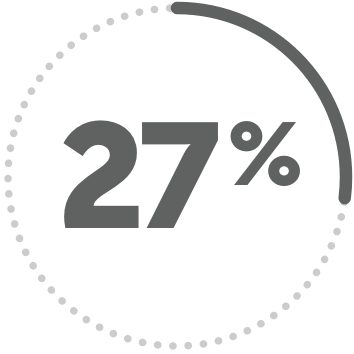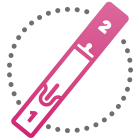HUMIRA for Moderate to Severe Juvenile Idiopathic Arthritis (JIA)
What is HUMIRA?
HUMIRA is a prescription medicine used alone, with methotrexate, or with certain other medicines to reduce the signs and symptoms of moderate to severe polyarticular juvenile idiopathic arthritis (JIA) in children 2 years of age and older.
HUMIRA Results for Juvenile Idiopathic Arthritis
During a 32-week period of a clinical study in JIA patients 4-17 years of age, fewer children treated with HUMIRA (both alone and in combination with methotrexate) experienced disease flare compared with those who did not receive HUMIRA.
IMPROVEMENT IN JIA SYMPTOMS

of children had improvement when treated with HUMIRA and methotrexate

of children had improvement when treated with methotrexate alone
In the same study, more children treated with HUMIRA and methotrexate had at least a 70% improvement in their polyarticular JIA symptoms at Week 48 than those who took methotrexate without HUMIRA.
Individual results may vary.
Common side effects of HUMIRA
Common side effects of HUMIRA include injection site reactions (pain, redness, rash, swelling, itching, or bruising), upper respiratory infections (sinus infections), headaches, rash, and nausea. These are not all of the possible side effects with HUMIRA. Tell your doctor if you have any side effect that bothers you or that does not go away.
Read about the Important Safety Information for HUMIRA.

Start with support that’s designed around you
HUMIRA Complete gives you access to potential savings, injection training guides, and other helpful resources. Plus, you’re a phone call away from getting help with insurance coverage support.

HUMIRA dosing for JIA in children 2 years of age and older
Important: The doctor will take your child's weight into consideration when deciding the appropriate dose. Your child’s first injection must be given under the supervision of a health care professional.
Recommended dosing varies depending on your child’s body weight. Always follow the doctor’s instructions about when and how often your child should take HUMIRA.*
For children weighing 10 kg (22 lbs) to less than 15 kg (33 lbs), the recommended dosage is 10 mg every other week.
For children weighing between 15 kg (33 lbs) to less than 30 kg (66 lbs), the recommended dosage is 20 mg every other week.
For children weighing 30 kg (66 lbs) and greater, the recommended dosage is 40 mg every other week.
HUMIRA is given by an injection under the skin.
Your child should continue taking HUMIRA as directed by your child’s doctor. Remember, HUMIRA is a treatment, not a cure. Your child’s doctor can tell you if and when your child should stop taking HUMIRA. Remember to keep HUMIRA refrigerated in its original container until ready for use.
HUMIRA has not been studied in patients with polyarticular JIA less than 2 years of age or in patients with a weight below 10 kg (22 lbs).
Your child's doctor will follow up with you on a regular basis. For more information, refer to the Patient Instructions for Use and the Medication Guide located inside the HUMIRA carton, and within the Full Prescribing Information. If your child experiences any adverse reactions or discomfort when taking HUMIRA, discuss them with their doctor right away.
*Refer to the Patient Instructions for Use to learn about the HUMIRA Pen and prefilled syringe.

How does HUMIRA work?
The protein TNF-alpha is believed to be part of your body’s natural processes involved in creating inflammation, and in some cases, excess inflammation. When used as prescribed, HUMIRA targets and blocks TNF-alpha, which can help reduce excess inflammation associated with juvenile idiopathic arthritis.
Already prescribed HUMIRA?
HUMIRA Complete gives you helpful resources and one-to-one support.
